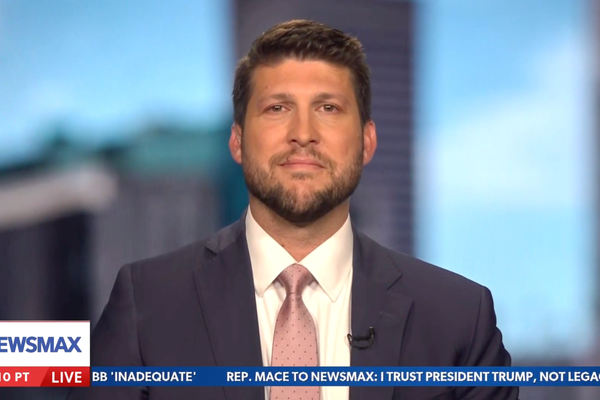Novo Nordisk, the weight-loss trailblazer known for that catchy "Oh, Oh, Oh, Ozempic!" jingle, is rapidly ceding market share to Eli Lilly. The paradigm shift is showing up in Novo Nordisk stock.
And this is happening despite a massive push from the Danish drugmaker to hold onto its lead. Over the past five months, Novo Nordisk has inked significant deals, including with notable telemedicine outfit Hims & Hers Health. The company's obesity blockbuster, Wegovy, won the preferred spot on CVS' Caremark formulary. And a federal court officially blocked compounders from knocking off its semaglutide-based drugs, Ozempic and Wegovy.
To be sure, Novo remains a weight-loss leader. Its marquee GLP-1 drugs are still outselling Eli Lilly's — narrowly. In the first quarter, Ozempic and Wegovy brought in nearly $7.2 billion in sales, leading $6.2 billion from Mounjaro and Zepbound.
But Novo also cut its guidance for 2025, blaming "unlawful compounding." While Lilly expects full-year sales to climb 29% to 35%, Novo now calls for its 2025 sales to grow 13% to 21% in constant currency.
Novo Nordisk stock has lost more than half its value after topping out above 148 in June 2024. This year, shares are down roughly 18%. The move has been so stark that Novo's board fired Chief Executive Lars Fruergaard Jorgensen. It's important to note, Lilly shares have also fallen in 2025, down 6%.
Shams Afzal, managing director at Carnegie Investment Counsel, says Novo has "squandered" its lead in GLP-1 drugs. The company grew from "an average pharma to a nearly household name" during the years Jorgensen led Novo.
"Novo seems to be struggling to maintain its incremental innovation momentum," he said in an email to Investor's Business Daily.
Novo Nordisk Stock Nearly Tripled
Wegovy won Food and Drug Administration approval in June 2021.
Launching a weight-loss drug in the midst of the Covid pandemic was like catching lightening in a bottle, says Dr. Sulagna Misra. Misra founded a Los Angeles-based direct primary care practice called Misra Wellness. She works with patients who use weight-loss drugs Wegovy and Zepbound.
"It was a global traumatic event," Misra told IBD. "We couldn't do anything except eat and drink and make sourdough bread. ... Covid was the perfect storm for us to gain weight and then be ashamed because now we all have a little agoraphobia."
"It was like the perfect time for this to happen," she added.
Mounjaro Is Expected To Top Ozempic
Novo Nordisk stock ended 2021 at 56 and nearly tripled over the next three years. Wegovy became a blockbuster drug in 2023, shooting from $885 million in 2022 sales to almost $4.57 billion. It's projected to reach nearly $23 billion in 2030 sales, according to FactSet.
But analysts say the pendulum has begun to swing the other way.
Some of that is evident from sales projections for Mounjaro. The Street expects Mounjaro sales to top Ozempic sales for the first time in 2026. The gap is expected to widen over the next five years. Mounjaro is projected to generate $34.5 billion in 2030 sales, vs. predictions for $22.3 billion in Ozempic sales.
Zepbound, though, isn't expected to top Wegovy before 2030. But analysts expect a heated race at a forecast $21.3 billion vs. $22.9 billion, respectively.
Why Eli Lilly Is Rapidly Advancing
Eli Lilly's advance became more pronounced in late 2024.
In the fourth quarter, Zepbound took the lead for the first time in terms of weekly prescriptions, said Carnegie's Afzal. The New York Times noted as much in a recent story, citing data from industry tracker Iqvia. Americans have filled more Zepbound prescriptions this year than Wegovy scripts, according to the report.
Misra credits a head-to-head study that pitted Wegovy and Zepbound. Lilly published the topline results of that study in December. Recently, the company released the full results. Patients who took tirzepatide-based Zepbound lost 20.2% of their body weight over 72 weeks compared to 13.7% for Wegovy recipients.
In other words, the group who took Zepbound lost nearly 50% more weight than the Wegovy group. That translated to an average of 50 pounds lost among Zepbound recipients vs. 33 pounds for Wegovy patients.
Marketing 'Oh, Oh, Oh, Ozempic!'
Here's an interesting twist: The vast majority of Americans likely don't know Zepbound is more effective than Wegovy, according to Leerink Partners analyst David Risinger. That could be why Novo still owns the lion's share of the market for obesity drugs. According to FactSet, Novo Nordisk has a nearly 65% grip on the market vs. just 34% for Eli Lilly. The diabetes space is more competitive, though, with Lilly owning about 41% compared to 38% for Novo.
Misra, the physician, says the branding behind Ozempic is key to Novo's success — and why the company is still competitive despite Zepbound's effectiveness edge over Wegovy. She compared Ozempic to Botox, the first injectable botulinum toxic to smooth wrinkles. AbbVie sells Botox, but there are other companies in this space. Still, "Botox" is synonymous with wrinkle treatment in the same way that "Kleenex" relates to tissues and "Xerox" is tied to copy machines.
"We don't talk about 'tirzepatide face' or 'Zepbound face,' we talk about 'Ozempic face,' " she said. "We use 'Ozempic' just like we use 'Botox.' It's just the brand that we're acknowledging and that's powerful because all of this is just marketing."
Novo Nordisk Makes Its Stand
This year, alone, Novo has signed a collaboration deal with Septerna to test a pill to treat obesity and a licensing deal with The United Laboratories in China for a triple approach to weight management. Like Lilly's experimental retatrutide, that drug would target GLP-1, GIPR and glucagon.
Novo Nordisk also inked a deal to allow Hims to sell Wegovy at a discounted rate in combination with a Hims & Hers membership.
"It's definitely going to increase their market share," said Jayne Hornung, chief clinical officer at health care technology firm MMIT. "Patients definitely do not like to go to the doctor. Going online, answering a few questions, getting an evaluation, getting a prescription and having something mailed to your house is very attractive to patients."
It's important to note, Lilly has its own telemedicine deals with Ro.co and LifeMD.
She also predicts the Caremark formulary decision will drive more patients to Novo's offerings. But Carnegie's Afzal said the deal came with a steep price cut for Wegovy. Misra says most of her patients face insurance denials. They typically opt for the cash-pay price, sidestepping insurance entirely.
Insurance Coverage Is Still Lagging
That's a problem for broad uptake of GLP-1 drugs, Hornung told IBD.
The Centers for Medicare and Medicaid Services recently denied a Biden administration proposal that would have had the agency cover the cost of weight-loss drugs. The only time the agency pays for obesity treatments is when they also treat a related condition, like sleep apnea or reducing the risk of cardiovascular conditions.
According to the Centers for Disease Control and Prevention, roughly 40% of Americans age 20 and older have obesity. Nearly three-quarters, 73.6%, have obesity or are considered overweight. So, there's enough market to go around, says Hornung.
"Can we get insurance companies to pay for it?" she said. "Can we drive the price down a little bit for those that are paying out of pocket? Can we add wraparound services to the patients that are on the product so that they stay on it and are more adherent to it?"
Novo Nordisk, Eli Lilly Tee Up Next-Gen Drugs
For Novo Nordisk stock, though, it will be important to see how the company builds its pipeline of experimental weight-loss drugs, says Carnegie's Afzal.
"The average end-user may not be as discerning between a choice of 15% vs 20% total weight loss potential," he said. "However, with semaglutide's loss of patent exclusivity in 2017, Novo needs a new game changer in its pipeline soon."
In addition to the licensing and collaboration deals, Novo is also working on drugs called amycretin and CagriSema. In January, Novo reported promising results for amycretin. Patients who took the highest dose of the weekly shot lost 22% of their body weight over 36 weeks, compared to a 2% weight gain for the placebo group. But CagriSema results disappointed in March and Novo Nordisk stock tumbled.
But Novo Nordisk could soon upset the market. The company unexpectedly filed for approval of an oral form of semaglutide based on final-phase results that debuted several years ago. This helped Novo leapfrog Lilly, which was projected to be the first to launch an obesity pill. Lilly is expected to have the results from its Phase 3 study of orforglipron, its experimental weight-loss pill, in the third quarter.
The First Weight-Loss Pill?
Hornung, of MMIT, says Novo Nordisk could still claw back some of what Lilly has taken in the market.
"Novo is going to far surpass Lilly if they come out with an oral GLP-1 because people do not like to inject themselves," she said. "I think the pills are going to change the landscape a lot for patients and we'll see what happens when we have oral versions on the market."
Daniel Bohsen, Novo Nordisk's senior vice president of finance and operations, notes the company has been in the obesity space for over two decades.
"Rather than focusing on market share, our efforts are to expand the market, including serving the oral segment within anti-obesity medicine," he said in an email to IBD. "Oral sema 25 mg will potentially be the first oral GLP1 obesity treatment and we are excited to bring this drug to patients next year."
Representatives of Eli Lilly didn't return a request for comment.
View More Weight-Loss Drugs News And Analysis
Follow Allison Gatlin on X/Twitter at @AGatlin_IBD.







